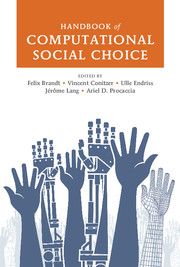18 - The Axiomatic Approach and the Internet
from Part IV - Additional Topics
Published online by Cambridge University Press: 05 May 2016
Summary
Introduction
The Internet reinforces types of multiagent systems which can effectively utilize this new media. Reputation systems, ranking systems, trust systems, recommendation systems, affiliate marketing in social networks, and more, are flowering in its midst. This recent wave of online social systems is typically associated with a large amount of data that is collected online, which leads to the “big data” approach to the utilization of such information. Quite surprisingly, however, the abundance of available data does not help system designers to come up with the right design for online systems in the first place. Indeed, available data is typically generated by the use of a particular system, and mining the data generated by users while interacting with one system does not provide a tool for exploring the overwhelmingly large design space. Interestingly, the main practical approach to software and hardware design, the formal specification of clear system requirements and the implementation of a system satisfying these exact requirements, has not been used often. This classical approach, when adapted to the context of multiagent systems, coincides with extensions of a standard tool of social choice theory and cooperative game theory, namely, the axiomatic approach.
The use of axioms can be either in a descriptive or in a normative context. In both cases basic properties of a system are phrased as axioms. In the descriptive approach a basic set of properties of a known system is sought out, with the aim of finding one that characterizes the system uniquely, hence teaching us much about its essence. The normative approach, on the other hand, starts from a specification of a basic set of requirements which is followed by an attempt to construct a system that satisfies them. Our goal in this chapter is to demonstrate both approaches in the context of the Internet. Perhaps the best known axiomatic theory in the social sciences is the theory of social choice. In the classical social choice setting we have a set of voters and a set of alternatives, where each voter has a ranking over the set of alternatives, and our aim is to find a good aggregation of the individual rankings into a global (or social) ranking. Various properties of such aggregation functions have been considered and have led to different characterizations of particular systems as well as impossibility results showing no system can satisfy certain sets of properties all at once.
- Type
- Chapter
- Information
- Handbook of Computational Social Choice , pp. 427 - 452Publisher: Cambridge University PressPrint publication year: 2016



